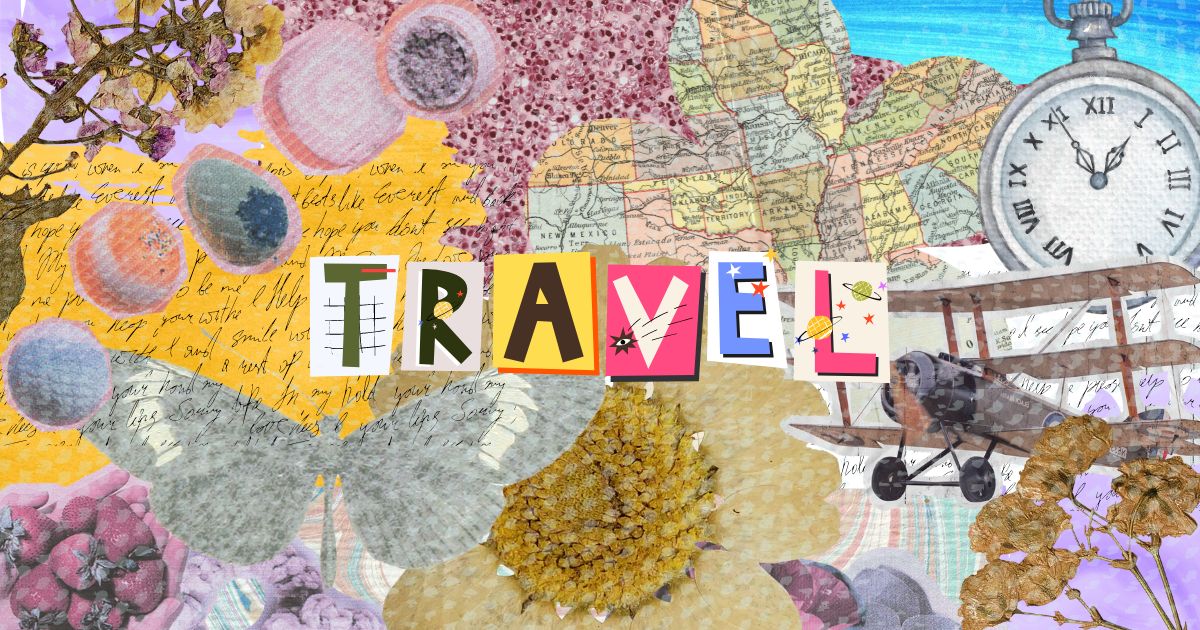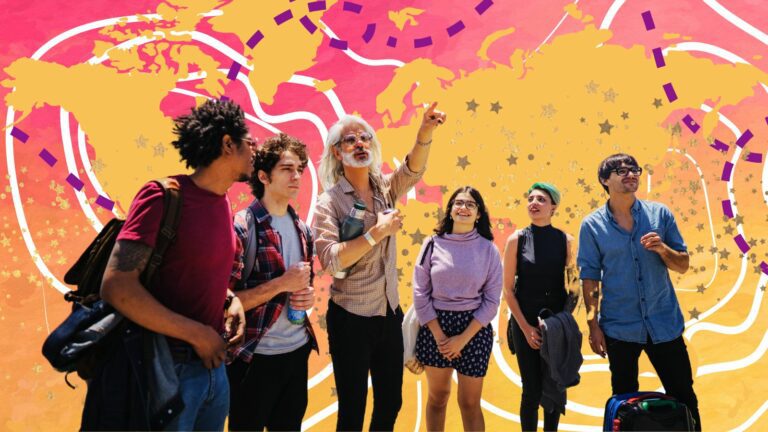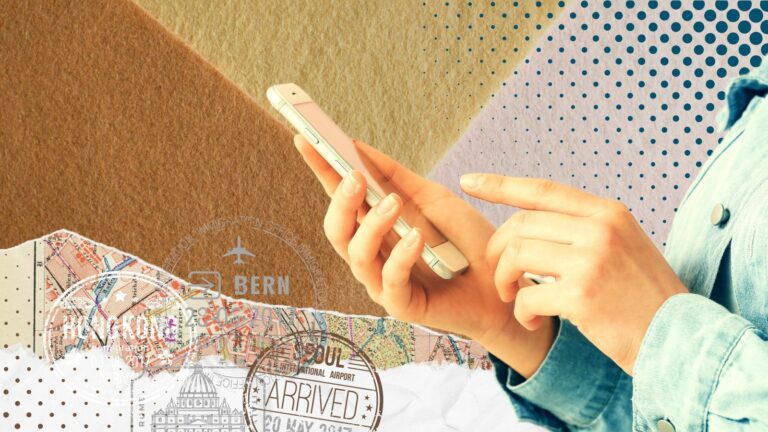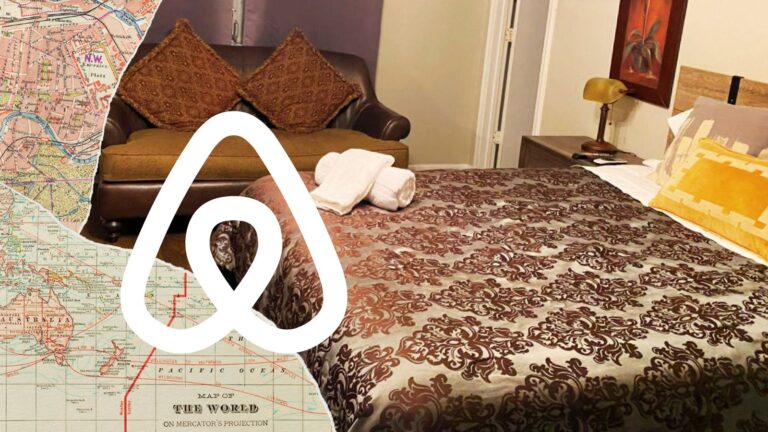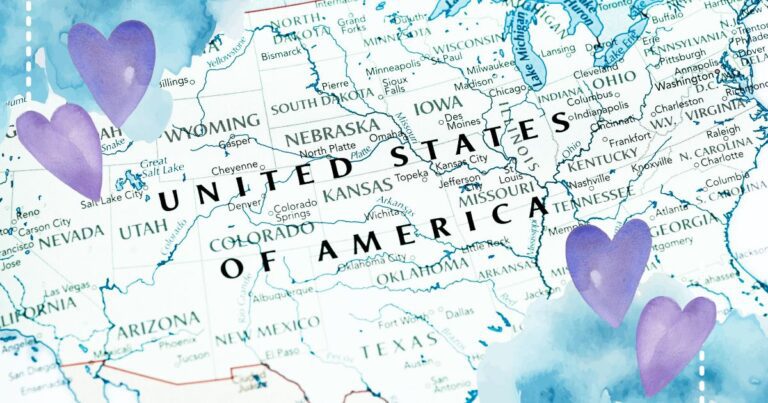A Nomad’s Travel Glossary
The travel community has a lot of terms that can feel confusing, especially when you’re new and just starting to plan a trip. It’s not exactly jargon, but it’s not as straight-forward as you’d probably like, either.
Like, figuring out if you’re a flashpacker, a shoestring budget traveler, a solo traveler or a day tripper is confusing enough without having to worry about what exactly those terms mean. That’s where this glossary comes into play!
It’s a collection of travel-related words, focusing on the stuff you’ll need to know for planning and going on a trip. There’s also some acronyms and specific travel community words you should know if you plan on joining some Facebook groups or Whatsapp chats.
There’s more than 70 words in the glossary, organized alphabetically. If you’re looking for something specific, try Ctrl+F to find it on the page or use the A-Z index at the top.
Just Gone Wandering is supported by readers! This post contains affiliate links. If you click on a link and buy something, I get a small percentage at no extra cost to you. Your support helps keep this blog running— thank you! Read full disclosure here.
Airbnb
A website where people rent out their homes or rooms to travelers. Usually more impersonal than a B&B, but you can sometimes meet hosts who want to take you around and show you the sites.
Arrival
When you reach your destination (e.g., flight arrival time). Also used when booking hotels, as many want to know your arrival time (to the hotel) so they can get your room ready and/or have staff available to check you in.
ATM (Automated Teller Machine)
A machine where you can withdraw money from your bank account. They’re found all over the world, though sometimes they only work with local debit cards. An international machine will say it somewhere obvious. Modern ATMs let you take out cash using a digital card on your phone (see “cashless payment”).
Backpacker
A type of traveler who typically travels on a budget, carrying all their belongings in a single backpack. Backpackers often stay in hostels, take public transportation, and explore countries for extended periods, seeking authentic experiences and adventure while minimizing costs. “Going backpacking” means traveling to a country, or multiple countries, in that same style.
Bed and Breakfast (B&B)
A cozy, often family-run accommodation where you get a room and breakfast in the morning—hence the name! B&Bs are usually smaller and more personal than hotels, run by locals who know everything about their hometown. Found most often in Europe.
Budget travel
Traveling with a focus on saving money. Basically: finding cheaper options for accommodation, transportation, and activities, like staying in hostels, taking public transport, and going to free or low-cost attractions. If you’re on a very tight budget, you’re a shoestring budget traveler.
Business travel
Trips taken for work rather than fun, often involving meetings, conferences, or corporate events. While it’s mostly about getting the job done, business travel can sometimes include a bit of leisure time, aka “bleisure” travel.
Campsite
An outdoor area where you can set up a tent or park an RV. Sometimes they also have cabins to rent! Some campsites are free, while others paid. Most of the time they have some public toilets and showers, and a place to throw away trash. Some also have spaces for campfires and cooking. Setting up a tent in a non-designated campsite is called wild camping.
Cashless payment
Paying with a card or digital method instead of cash. This can include Apple Pay, Google Pay, and Samsung Pay on your phone, or a QR payment through an app. Many places accept cashless payment nowadays, though again they might only be available to local banks or systems. Best to carry cash as a backup.
Certified guide
A guide who has formal training and certification, often required for leading tours in certain historical or protected areas. If a location has certified guides available, they’ll have info at the front of the entrance or on their website. Using a certified guide supports locals and local sites, so it’s a worthwhile expense!
Check-in
The process of confirming your arrival at a hotel (or airport). Most places have online check-in, but it’s always a good idea to go in person when you first get to a hotel as sometimes you’ll get free stuff!
Check-out
The process of leaving a hotel and paying your bill. Sometimes you can do this through an app!
Coliving
Like a hostel, but for digital nomads. Guests share living spaces like kitchens and lounges, but have their own private bedrooms. Usually also has events and outings for guests, hosted by the coliving company.
Connecting flight
A flight where you change planes partway through the journey. (And then you’d have a layover.)
Couch surfing
Staying for free at someone’s home, typically on a couch or spare bed. It’s often arranged through platforms like Couchsurfing.com, which connects travelers with hosts around the world. Popular with shoestring budget travelers but also a good way to meet locals.
Coworking space
A shared office space where remote workers and digital nomads can rent a desk or office. Usually provides coffee/tea for free, and the better ones also have snacks.
Cultural tour
A tour focusing on the history, art, and traditions of a location, often including museum visits, local performances, or artisan workshops.
Customs (at the airport)
The place where your belongings may be checked for restricted items when entering a country. Usually this means going through a scanner, but sometimes it’s more involved and the customs officials will literally go through your luggage piece by piece.
Day tour
A short tour, usually lasting a few hours or a single day, focusing on a particular site or area.
Digital nomad
A person who works from their computer while traveling, either outside of their own country or away from their hometown. Digital nomads have all kinds of jobs, but the thing they have in common is they’re all done online. Seasonal workers, in contrast, work offline to earn money (see below).
Direct flight
A flight that goes straight to your destination without stops.
Dopp kit
A small toiletry bag used for organizing bathroom essentials like toothpaste, razors, and shampoo. Named after its creator, Charles Doppelt.
Eco-tour
A tour designed to be environmentally friendly, often focusing on nature and wildlife while minimizing the impact on the environment. Laos has some great eco-tours, actually.
ETA (Estimated Time of Arrival)
The expected time you will arrive at your destination.
ETD (Estimated Time of Departure)
The expected time a flight or train will leave.
Excursion
A short, usually day-long trip to a nearby attraction or destination, often organized as part of a longer trip or vacation. This specific term is used most often on cruises and in resorts. Excursions include guided tours, sightseeing, or adventure activities.
Flashpacking
Like backpackers, but fancier and on a higher budget. Flashpackers often have higher-end equipment, stay in nicer hostels (in private rooms), and splurge on activities or meals.
FOMO (Fear of Missing Out)
The anxiety of feeling left out of fun or interesting experiences. It’s why travel influencers are so successful.
Food tour
A tour centered around sampling local cuisine, visiting food markets, and trying traditional dishes. An excellent way to experience local life in a low-pressure environment. Best done in large food hubs, like Kuala Lumpur or Tokyo.
Freelancing
Working for various clients on a contract basis instead of for a single employer. Lots of digital nomads are freelancers.
Free walking tour
A tour where guides offer their services for free but rely on tips from participants. GuruWalk is a good place to find free walking tours.
Glamping
A blend of ‘glamorous’ and ‘camping,’ referring to a style of camping with luxury amenities. You might stay in a yurt with heating and a cushioned bed, rather than a basic tent on the ground in a sleeping bag, for instance.
Group tour
A tour with any number of participants (more than 1), who don’t know each other, led by a tour guide. Small group tours are usually under 15 people, and large ones can get up to even 50 people. If you hired a guide for just yourself, that’s a private tour.
Guided tour
A tour led by a person who shares information and stories about the destination. These can be group tours, eco tours, day tours, walking tours, private tours, etc.
Guesthouse
A small, privately owned accommodation similar to a B&B, but with fewer frills. You may or may not get breakfast, and the hosts may be more “business-like.” These are found more in Asia than B&Bs but they’re very similar.
Home exchange
An arrangement where two people swap homes for a set period of time, allowing each to live in the other’s home for free. If you already own a home, this is a good way to explore other parts of the world without having to fork over tons of cash for accommodation.
Hop-on hop-off tour
A bus tour where you can get off at certain stops to explore and then catch the next available bus or boat to continue the tour. Very popular in big cities with lots of tourist sites to get to. Big Bus Tours is a good website to find HOHO tours in major cities.
Hostel
A budget-friendly accommodation where travelers share rooms, bathrooms, and common areas with other guests. Very popular with backpackers, but some hostels are trying to attract digital nomads and have added coworking spaces to their offerings. Hostelworld is one of the best places to find hostels.
House Sitting
Looking after someone’s house in exchange for accommodation (and sometimes money). TrustedHousesitters is one platform where you can do house sitting/pet sitting for free in exchange for a place to stay.
Immigration (at the airport)
This is the checkpoint you pass through when entering a new country, where border control officers check your passport, visa, and other travel documents. They make sure you’re legally allowed to enter the country, and they may ask questions about your trip, such as the purpose of your visit and how long you plan to stay. You may need to show proof of onward travel here.
Itinerary
A detailed plan of your trip, including where you’re going and what you’ll be doing each day.
Layover
A break in your transit, usually when changing planes at an airport or switching lines at a train station.
Local
Refers to someone who lives in the area or a restaurant/store that isn’t a chain or tourist-focused. Travelers are obsessed with finding local places to visit.
Local guide
A person from the area who offers insight and personal knowledge about the region’s history, culture, and attractions. Could be a professional tour guide, but could also just be someone who unofficially links up with travelers.
Location-independent
A person who can work from anywhere without being tied to a specific place. A digital nomad!
Luxury travel
The high-end side of travel, where comfort and premium experiences are the focus. Think five-star hotels, private tours, first-class flights, and personalized service that caters to your every need.
Merino wool
A natural fiber from Merino sheep that’s known for being soft, lightweight, and temperature-regulating. Merino wool is a favorite for travelers because it’s breathable, quick-drying, and naturally odor-resistant, making it perfect for multi-day wear without needing a wash.
Nomad
A person who travels from place to place without a permanent home. In modern times, it mostly means digital nomads or seasonal workers who travel around while working, but it can also mean retired folks who do the same.
Off the beaten path
Places that are less known or visited by (usually foreign) tourists. Usually travel bloggers call these places “hidden gems.”
Onward travel
The plans or ticket you need to show that you’re leaving your destination and continuing to another place, either within the same country or to another one. Many countries (and/or airline staff) require proof of onward travel before they let you enter, like a return flight or a bus/train ticket to another destination. It’s basically a way to prove you won’t be overstaying your welcome!
One bag
A way to pack where everything you need is in a single carry-on bag (backpack or suitcase). Popular with people who use a lot of low-cost carrier flights as they’re very restrictive on luggage. Onebag.com is the best place to learn about one bag travel.
Overland travel
Traveling by road or rail instead of flying. This includes buses, trains, cars, bicycles, and even walking! Getting more popular lately as people worry about the carbon footprint of airplanes.
Pet sitting
Caring for someone’s pets while they’re away, often in exchange for free accommodation. Travelers can use platforms like TrustedHousesitters to find pet-sitting gigs that allow them to stay in a local’s home, take care of pets, and explore a new destination without accommodation costs.
Private tour
A tour organized specifically for you or your small group, with no other people in the group. Usually more expensive than a shared group tour, but good if you have specific things you want to see as you can tailor the experience to your preferences.
Private transfer
A transport service that is booked in advance of your arrival, offering direct and private travel between locations, such as from an airport to a hotel. Great for places that don’t have good public transit or rideshares, or for when you’re coming in very late on a flight.
Public transportation
Think buses, trains, subways, and trams! It’s a slower overall option but great for saving money. Plus you can see how locals get around their city and experience a bit of local life!
Remote work
Working from anywhere outside of a traditional office, often online. Digital nomads do this.
RTW (Round the World)
A type of trip where you visit multiple countries across the globe in one extended journey, usually limited to a year or two. Sometimes travelers buy a single RTW ticket through an airline, but that’s gotten less popular nowadays.
Seasonal work
Jobs that are available during specific times of the year, often based on tourism, agriculture, or hospitality, such as ski resorts in the winter or farms during harvest seasons. Many travelers take up seasonal work to earn money to travel in the off-season.
Self-guided tour
A tour where you explore a location on your own, often with the help of an audio guide, map, or mobile app. Usually very cheap or free, and perfect for people who want to explore places on their own without having to hire a guide or join a group tour.
Slowmad
Name for full-time travelers (nomads) who travel the world at a slower-than-usual pace, usually staying in a single city for a month or more at a time.
Slow travel
A travel philosophy about spending more time in each destination to truly experience the local culture, lifestyle, and surroundings. Usually slow travelers get apartments in one city for a month or more. Popular with long-term nomads and digital nomads.
Solo travel
Traveling alone! You’re not traveling with a friend or family member. You might join a group tour, but you’re still solo if you’re going to that tour by yourself.
Souvenir
A small item you buy to remember a place you visited. Popular souvenirs are magnets, postcards, shot glasses and pressed coins.
Staycation
A vacation spent at home or nearby rather than traveling far away. Popular for weekend trip-takers. Especially good if you live somewhere that’s a popular tourist destination already.
Technical clothing
Clothing designed for performance (sports or outdoor activities), often using specialized fabrics that are breathable, moisture-wicking, and quick-drying. Ideal for travelers who need clothes that can handle various weather conditions and activities without sacrificing comfort. Icebreaker and Columbia are two companies that make technical clothing.
Tipping
Extra money given to service workers, like waiters or hotel staff, to show appreciation for their service. Not every country does tipping, but generally, it’s expected to tip tour guides and private drivers no matter what.
Tour operator
A company or individual responsible for organizing and conducting tours, often offering packages that include transportation, accommodation, and guided experiences. All the listings on Viator are from different tour operators, for instance.
Tourist
Someone visiting a place for leisure, sightseeing, or vacation, often for a short period of time. Tourists typically visit popular attractions and stay in hotels or resorts, and their trips are usually planned in advance. They tend to use guidebooks a LOT. Some travelers get snooty about this, but technically everyone is a tourist at some point.
Travel agent
A person who helps plan, book, and arrange travel experiences, from flights and accommodation to tours and activities. Travel agents are usually free and work on commission, basically. They’re great because they have advice for specific locations and get access to deals or packages that aren’t available to the general public.
Traveler
A traveler is someone who explores different places, often with a focus on experiencing the local culture. Travelers may take longer trips, explore off-the-beaten-path locations, and travel in a more flexible, spontaneous way. They pretend they don’t use guidebooks.
Tourist trap
A place that is over-commercialized and often expensive, targeting tourists and trying to get them to spend a lot of money on something not really worth the experience. Some popular destinations are themselves not a tourist trap, but the experience getting to those places makes it feel like a trap.
Transit
The act of traveling from one place to another, usually referring to transportation like buses, trains, and planes. If it’s “transit” in an airport, it’s the part that’s after you arrived but before you go through customs/immigration (like “transit hall”).
Travel insurance
Insurance that covers medical or trip-related emergencies during your travels. Very important to have in case something happens! Luggage gets lost, phone gets stolen, flights get canceled? Travel insurance will help!
UPF clothing
A type of technical clothing made with fabrics that provide Ultraviolet Protection Factor (UPF), blocking harmful UV rays (aka the sun) from reaching your skin. It’s especially useful for long outdoor adventures or sunny destinations where sun protection is a must. My favorite UPF stuff is from Columbia.
Visa
An official document or stamp that allows you to enter or stay in a country for a certain period of time. Sometimes this is electronic, and it’s called an eVisa. If you’re a digital nomad on a long visa, it’s a digital nomad visa.
VPN (Virtual Private Network)
A service that helps protect your internet connection and privacy while working online, especially useful in public Wi-Fi areas. Highly recommended! I use ExpressVPN, myself.
Walking tour
A tour on foot, usually exploring a specific area, like a city’s historical center or a nature reserve, lead by a tour guide. Usually you meet the guide somewhere in the city and then walk around totally on foot, unlike other tours where you get picked up in a car or van.
Work exchange
Trade your skills or labor (like gardening, farm work, or teaching) for free accommodation and sometimes meals. Platforms like Workaway and WWOOF (World Wide Opportunities on Organic Farms) are popular for this kind of thing.
YOLO (You Only Live Once)
Used to justify spontaneous or adventurous decisions, especially while traveling. It’s why people blow through their travel budget faster than they expected!
Save to Pinterest
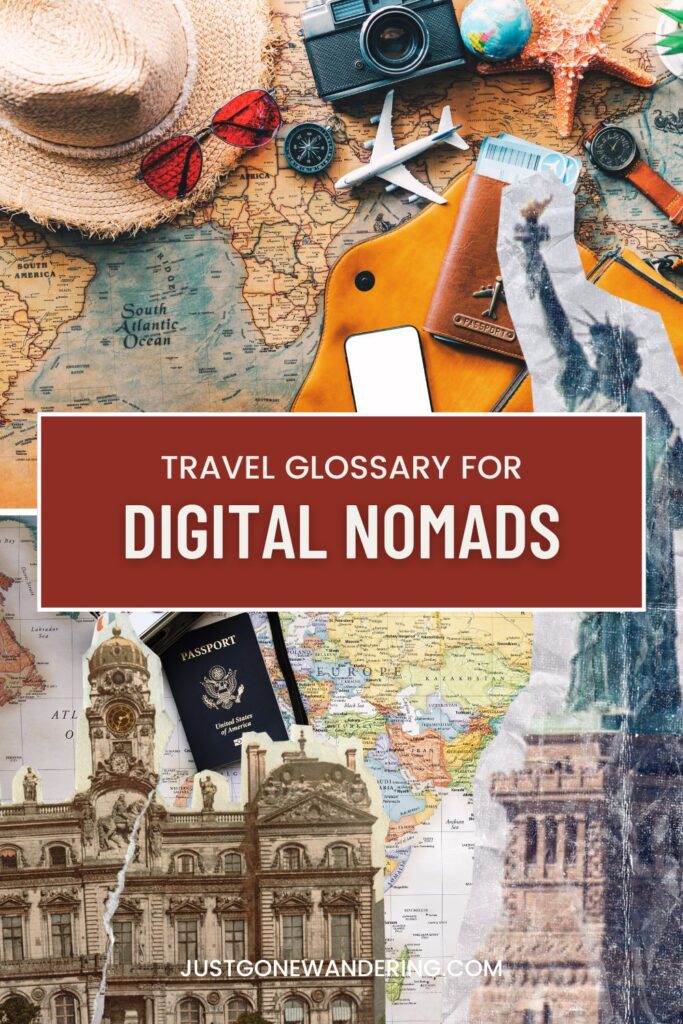
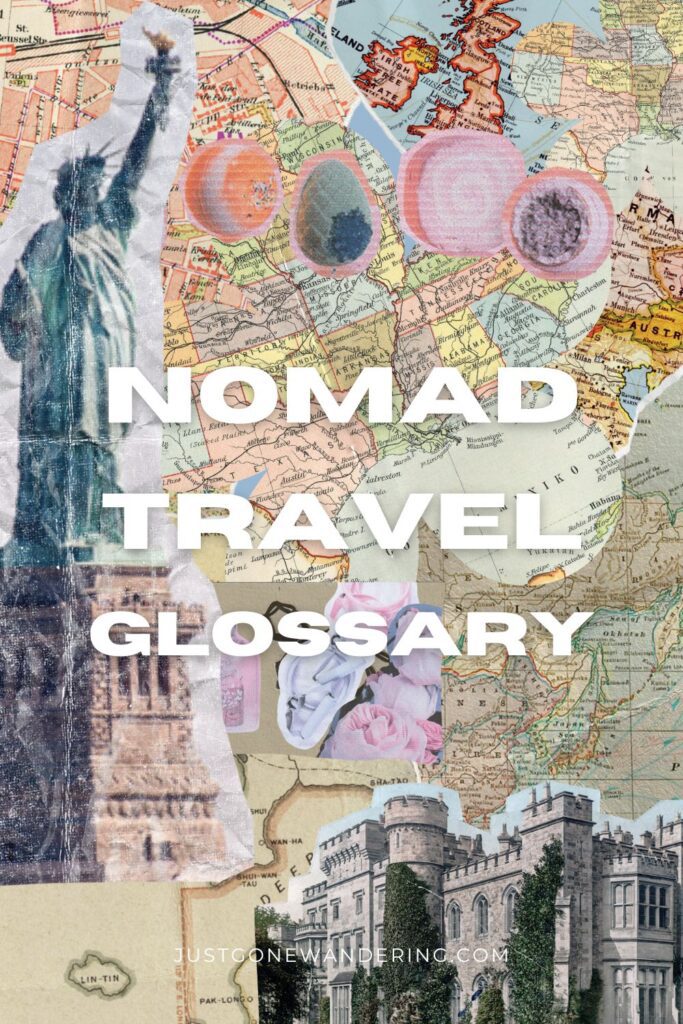
Explore More
Nomad Living
- How to Plan a Year of Full-time Travel
- Packing List for Perpetual Travel (Solo Female Cozy Budget Style)
- Backpack vs. Suitcase for Long-Term Travel
- How to keep in contact while traveling abroad
- The BEST WhatsApp Travel Group Chats
- 90+ Active Facebook Groups for Travelers
- Where to Stay Besides Hotels When Traveling Long-Term
- Travel kitchen essentials | Hotel cooking
- Best Resources for Long-Term Travel
Best Travel Resources
- 👩💻Stay organized with the Deluxe Travel Planner Spreadsheet
- 🛌Search Hostelworld for budget stays
- ✈️Search SkyScanner for discounted flights around the world
- 😺Join TrustedHousesitters and do petsitting in exchange for accommodation
- 💳Carry Chase Sapphire Preferred for a travel-friendly credit card
- 📱Use Airalo for eSIMs around the world
- 🚙Check DiscoverCars for international car rentals
- 👩💻Snag ExpressVPN to stay safe while browsing the web
- 🧑⚕️Sign up with VisitorsCoverage for trip insurance

